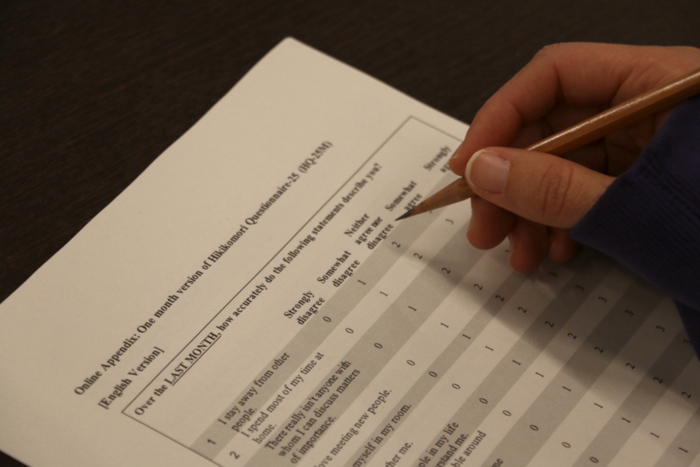Fukuoka, Japan—Kyushu University researchers have developed a new ‘Hikikomori Questionnaire’ in an effort to detect the condition at an earlier stage. Preliminary results show that ‘isolation’ is a possible factor that can distinguish between non-hikikomori and pre-hikikomori individuals, providing possible validation of the new questionnaire as a tool for early detection and treatment.

Credit: Kyushu University/Kato Lab
Fukuoka, Japan—Kyushu University researchers have developed a new ‘Hikikomori Questionnaire’ in an effort to detect the condition at an earlier stage. Preliminary results show that ‘isolation’ is a possible factor that can distinguish between non-hikikomori and pre-hikikomori individuals, providing possible validation of the new questionnaire as a tool for early detection and treatment.
Hikikomori is a complex pathological condition where an individual withdraws from society and remains at home almost every day for more than six months. Although it may be viewed as a condition unique to Japan, hikikomori has been reported globally from across Asia, to Europe and North America.
“Hikikomori was first defined in 1998. As we studied the condition, we found that it is a very complex pathology caused by an overlap of physical, societal, and psychological conditions,” explains Takahiro A. Kato of Kyushu University’s Faculty of Medical Sciences and first author of the study. “Its growing international recognition has put hikikomori into the purview of many researchers and medical professionals, especially on the heels of the years long COVID-19 pandemic. Just this year, Hikikomori was recognized in the revised edition of the DSM-5.”
Kato and his team have been working on measures to evaluate, identify, and treat hikikomori patients, to the point of opening the world’s first outpatient clinic for hikikomori individuals in 2013. In 2018, the team developed the ‘Hikikomori Questionnaire,’ or HQ-25, that was design to assess whether individuals under social withdrawal after six months are symptomatic of hikikomori.
“This questionnaire allowed us to identify symptomatic individuals with hikikomori. As our work progressed, we found that we needed an assessment tool that could evaluate symptomatic individuals at an earlier stage to help detect and potentially prevent hikikomori,” continues Kato.
The new Hikikomori Questionnaire, or HQ-25M—made in collaboration with Nihon University and Oregon Health and Science University—is composed of 25 questions that evaluate the three subfactors of socialization, isolation, and emotional support on a scale to 0–4, 4 being ‘strongly agree.’
For example, questions such as ‘I feel uncomfortable around other people’ gauge socialization, while ‘there are few people I can discuss important issues with’ covers emotional support.
The pilot test of the new questionnaire, reported in Psychiatry and Clinical Neurosciences, was conducted with 762 Japanese individuals. The questionnaire first asked about the individual’s social withdrawal status in the prior month in order to categorize participants into hikikomori, non-hikikomori, and pre-hikikomori groups. The team also added a questionnaire that evaluates the individual’s psychological distress during the same month.
“We analyzed the data to see any comparable differences between the different category groups,” explains Kato. “Multiple models showed us that hikikomori groups scored significantly higher on all metrics compared to non- and pre-hikikomori.”
Interestingly, between the pre- and non-hikikomori respondents, of all the three subfactors that were measured, the isolation subfactor was the only one that showed a significant difference in scores.
While still preliminary, the team is pleased with their initial findings and plans to use them to improve their questionnaire and data collecting.
“These initial findings are promising and show that our questionnaire may be a good tool for early detection of hikikomori,” concludes Kato. “Nonetheless, we have to work on expanding and diversifying our sample size and fine tune our questions. Moreover, since the hikikomori pathology is being reported around the world, we must work with researchers and patients outside of Japan.”
###
For more information about this research, see “One month version of Hikikomori Questionnaire-25 (HQ-25M): Development and initial validation,” Takahiro A. Kato, Yudai Suzuki, Kazumasa Horie, Alan R. Teo, and Shinji Sakamoto, Psychiatry and Clinical Neurosciences. https://doi.org/10.1111/pcn.13499
About Kyushu University
Kyushu University is one of Japan’s leading research-oriented institutes of higher education since its founding in 1911. Home to around 19,000 students and 8,000 faculty and staff, Kyushu U’s world-class research centers cover a wide range of study areas and research fields, from the humanities and arts to engineering and medical sciences. Its multiple campuses—including the largest in Japan—are located around Fukuoka City, a coastal metropolis on the southwestern Japanese island of Kyushu that is frequently ranked among the world’s most livable cities and historically known as a gateway to Asia.
Journal
Psychiatry and Clinical Neurosciences
DOI
10.1111/pcn.13499
Method of Research
Experimental study
Subject of Research
People
Article Title
One month version of Hikikomori Questionnaire-25 (HQ-25M): Development and initial validation
Article Publication Date
29-Nov-2022




